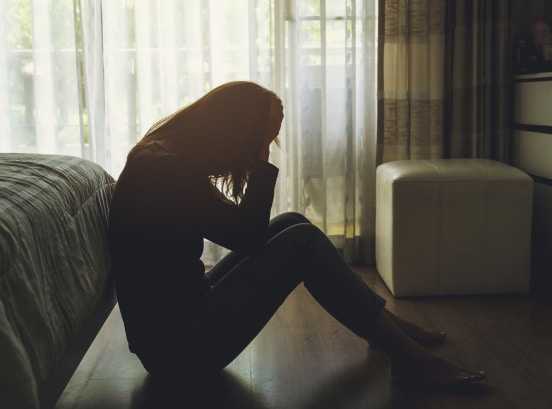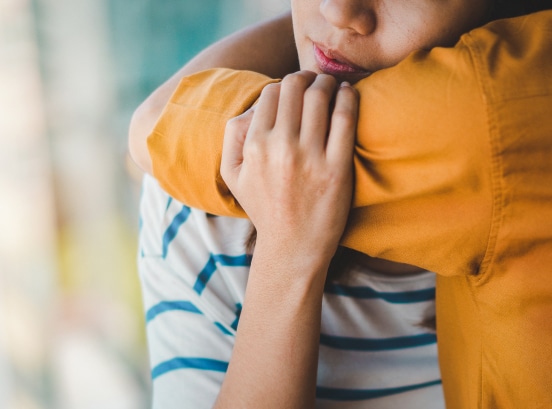Depression Treatment
Home / What We Treat / Dual Diagnosis Mental Health / Depression
What is Depression?
The National Institute of Mental Health (NIMH) estimates that 16 million Americans suffer from depression each year. Depression not only leaves people feeling lonely, pessimistic, and worthless, but it also hinders their ability to interact with family and friends.
Depression affects everyone differently, but thankfully depression treatment centers can provide help. Our depression treatment center provides the effective treatment needed to sustain recovery.

Signs and Symptoms of Depression
Recognizing depression can be challenging, as its symptoms may vary from person to person. Here are some common signs to look out for:
- Persistent Sadness: Feeling sad or down for an extended period, often without a clear reason, can be a sign of depression. It’s not just a passing mood—it lingers.
- Loss of Interest: Things that once brought joy or excitement may suddenly lose their appeal. Hobbies, social activities, or even spending time with loved ones may not feel as engaging as they used to.
- Changes in Sleep Patterns: Depression can affect sleep, leading to insomnia or, conversely, excessive sleepiness. Pay attention to significant changes in your sleep routine.
- Fatigue: A constant feeling of tiredness or lack of energy is a common symptom of depression. Even simple tasks may feel like a monumental effort.
- Changes in Appetite: Depression can influence appetite, leading to significant weight loss or gain. Keep an eye on any sudden changes in eating habits.
- Difficulty Concentrating: Focusing on tasks may become challenging, and decision-making might feel more difficult than usual. This can affect work or school performance.
- Physical Aches and Pains: Depression can manifest physically, causing unexplained pains or aches. These symptoms are real and can contribute to the overall burden of the condition.
If you or someone you know is experiencing several of these symptoms, it’s crucial to seek support. Understanding depression is the first step towards healing.
Types of Depression
Depression isn’t a one-size-fits-all condition. There are different types, each with its unique characteristics. Here are some common forms:
This is the most common type of depression. Individuals with MDD experience severe symptoms that interfere with daily life. Episodes can last for weeks or months.
Formerly known as dysthymia, PDD involves milder but long-lasting symptoms. It’s a chronic form of depression that can persist for years.
Bipolar disorder involves periods of extreme highs (mania) and lows (depression). It’s characterized by mood swings that can be intense and disruptive.
Some people experience depressive symptoms that coincide with specific seasons, usually during the fall and winter when there’s less sunlight.
This type of depression occurs after childbirth and involves intense feelings of sadness, anxiety, and exhaustion.Understanding the specific type of depression is crucial for tailoring an effective treatment plan.
Understanding the specific type of depression is crucial for tailoring an effective treatment plan.
Depression Treatment
The good news is that depression is treatable, and various options can help individuals regain control of their lives. Here are some common treatment approaches:
Counseling or psychotherapy, often known as talking therapy, is a cornerstone of depression treatment. It provides a safe space to explore thoughts, emotions, and behaviors, offering coping strategies and support.
In some cases, medication may be prescribed to help manage symptoms. Antidepressants can be effective in restoring the balance of neurotransmitters in the brain.
Simple lifestyle adjustments, such as regular exercise, a balanced diet, and sufficient sleep, can significantly contribute to managing depression.
Connecting with others who understand the challenges of depression can be immensely beneficial. Support groups offer a sense of community and shared experiences.
Mind-body practices like yoga, meditation, and mindfulness can complement traditional treatments, promoting overall well-being.

When left untreated, depression tends to escalate over time, potentially enduring for weeks to even years. Individuals coping with depression often face challenges in self-help. Nevertheless, acknowledging and understanding the symptoms of depression can serve as an initial stride towards progress.
If you or someone you know is struggling with depression, reach out to Magnolia Creek today. You are not alone, and healing is possible.
If you're ready to take the next step in the eating disorder recovery process for you or your loved one, the compassionate team at Magnolia Creek is here to help. Give us a call at 205-678-4373 or complete our contact form.
100% Confidential